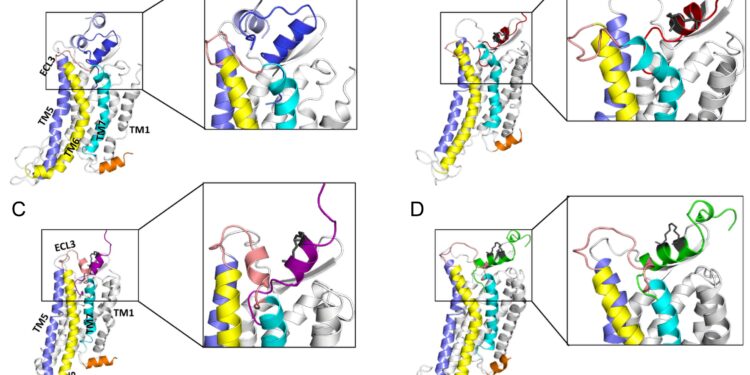An illustration of computer modeled structures of complexes formed between RXFP3 and B-chain stapled peptides of relaxin-3 or relaxin-3. Credit: NUS Yong Loo Lin School of Medicine and University of Colombo, Sri Lanka
Medications that treat conditions such as depression and anxiety often cause various side effects because they simultaneously regulate various functions of the human body. What if these drugs could activate only the functions that target the specific conditions for which they are designed?
A team of researchers has discovered a potential way to treat these conditions with fewer side effects. Led by Professor Gavin Dawe, Head of the Department of Pharmacology at Yong Loo Lin School of Medicine at the National University of Singapore (NUS Medicine), the team carried out modifications of relaxin-3, a neuropeptide or molecule found mainly in the human body. brain and nervous system – which regulate a wide range of physiological functions, including stress responses, appetite, mood and pain perception. When relaxin-3 is released in the brain, it binds to a target receptor RXFP3, to trigger various signaling responses between cells, which affect physiological processes in the body.
The results are published in the journal Scientific signage.
However, because RXFP3 is involved in many different functions, a drug developed to treat certain conditions may cause unwanted side effects because multiple RXFP3 signaling pathways are activated at the same time. For example, a medication that treats depression may cause adverse effects related to another function, such as eating behavior, which is linked to eating disorders and obesity.
Much existing research, including previous work by Professor Dawe, has also demonstrated that the receptor is a potential new target for drugs to treat these conditions. To develop better drug treatments with fewer side effects, the key is to activate only specific RXFP3 signaling pathways that target specific conditions.
The neuropeptide relaxin-3 and its target RXFP3 are produced by the brain. Credit: NUS Yong Loo Lin School of Medicine and University of Colombo, Sri Lanka
Professor Dawe’s team modified the relaxin-3 molecules, so that they only activate part of the RXFP3 response in their interaction, instead of all the different signaling pathways. Their work represents the first discovery that changes in relaxin-3 can lead to the selective activation of certain RXFP3-directed signaling pathways, a mechanism known as biased agonism.
Professor Dawe said: “Our study has highlighted potential ways to develop drugs by modifying relaxin-3, or other neuropeptides, which can selectively activate specific functions within the body. This is important because it means drugs could be designed to have more specific effects. and fewer side effects, making them more effective in managing a range of conditions like anxiety, depression, eating disorders, obesity and addiction.
Using a technique known as peptide stapling, the research team modified the B chain of relaxin-3, replacing the blocks of amino acids it contains with artificial blocks that introduce “bridges”. chemicals” between them. Alone, the B chain is very flexible and can twist and bend into many different shapes, reducing its ability to be stabilized for more efficient binding and activation of the RXFP3 receptor.
The stapling process locks the specific B-chain form of relaxin-3, stabilizing it for more effective interaction with the RXFP3 receptor, where it triggers certain signaling pathways in the brain that affect the body’s physiological functions.
The stapled B chain of relaxin-3 exhibits a bias toward G protein activation. Credit: NUS Yong Loo Lin School of Medicine and University of Colombo, Sri Lanka
Dr. Tharindunee Jayakody, first author of the study and a Ph.D. alumna of the Department of Pharmacology at NUS Medicine, said: “We are at the very early stages of the journey of manufacturing clinically useful medicines. However, the promising results of our study constitute an important step in our aspiration to design stapled peptides separately. which have selective effects on anxiety, depression, eating disorders and addiction. Our collaborative work would also strive to understand how proteins like RXFP3 function at the molecular level, with the help of biased agonists.
Jayakody leads a team of researchers aiming to understand the molecular properties of proteins such as RXFP3 at the Department of Chemistry, Faculty of Science, University of Colombo, Sri Lanka, where she teaches biochemistry and molecular biology.
With the conclusion of the study, the research team plans to use different stapled peptides to understand how signaling functions, activated by interactions between relaxin-3 and RXFP3, affect the organism’s physiological functions and behavior. human.
More information:
Tharindunee Jayakody et al, Mechanisms of biased agonism by Gα i/o-biased stapled peptide agonists of the relaxin-3 receptor, Scientific signage (2024). DOI: 10.1126/scisignal.abl5880
Provided by the National University of Singapore
Quote: Modifying the brain molecule relaxin-3 may potentially reduce side effects in treating anxiety, depression and more (February 20, 2024) retrieved February 20, 2024 from
This document is subject to copyright. Apart from fair use for private study or research purposes, no part may be reproduced without written permission. The content is provided for information only.



